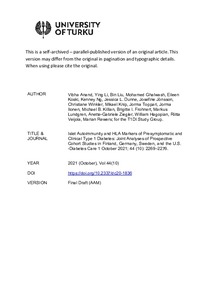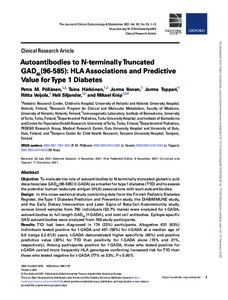Hae
Aineistot 1-6 / 6
Islet Autoimmunity and HLA Markers of Presymptomatic and Clinical Type 1 Diabetes: Joint Analyses of Prospective Cohort Studies in Finland, Germany, Sweden, and the US
<div><p>OBJECTIVE</p><p>To combine prospective cohort studies, by including HLA harmonization, and estimate risk of islet autoimmunity and progression to clinical diabetes.<br></p><p>RESEARCH DESIGN AND METHODS<br></p><p>For ...
Permutation-based significance analysis reduces the type 1 error rate in bisulfite sequencing data analysis of human umbilical cord blood samples
<p>DNA methylation patterns are largely established in-utero and might mediate the impacts of in-utero conditions on later health outcomes. Associations between perinatal DNA methylation marks and pregnancy-related variables, ...
Umbilical cord blood DNA methylation in children who later develop type 1 diabetes
<p><strong>Aims/hypothesis:</strong> Distinct DNA methylation patterns have recently been observed to precede type 1 diabetes in whole blood collected from young children. Our aim was to determine whether perinatal DNA ...
Autoantibodies to N-Terminally Truncated GAD65(96-585): HLA Associations and Predictive Value for Type 1 Diabetes
<p><strong>Objective</strong> <br></p><p>To evaluate the role of autoantibodies to N-terminally truncated glutamic acid decarboxylase GAD<sub>65</sub>(96-585) (t-GADA) as a marker for type 1 diabetes (T1D) and to assess the potential HLA-associations with such autoantibodies.<br></p><p><strong>Design</strong><br></p><p>In this cross-sectional study combining data from the Finnish Pediatric Diabetes Register, the Type 1 Diabetes Prediction and Prevention (DIPP) Study, the DIABIMMUNE Study, and the Early Dietary Intervention and Later Signs of Beta-Cell Autoimmunity (EDIA) Study, venous blood samples from 760 individuals (53.7% males) were analyzed for t-GADA, autoantibodies to full-length GAD<sub>65</sub> (f-GADA), and islet cell antibodies. Epitope-specific GAD autoantibodies were analyzed from 189 study participants.<br></p><p><strong>Results</strong><br></p><p>T1D had been diagnosed in 174 (23%) participants. Altogether 631 (83%) individuals tested positive for f-GADA and 451 (59%) for t-GADA at a median age of 9.0 years (range 0.2-61.5). t-GADA demonstrated higher specificity (46%) and positive predictive value (30%) for T1D than positivity for f-GADA alone (15% and 21%, respectively). Among participants positive for f-GADA, those who tested positive for t-GADA carried more frequently HLA genotypes conferring increased risk for T1D than those who tested negative for t-GADA (77 vs. 53%; P<0.001).<br></p><p><strong>Conclusions</strong><br></p><p>Autoantibodies to N-terminally truncated GAD improve the screening for T1D compared to f-GADA and may facilitate the selection of participants for clinical trials. HLA class II-mediated antigen presentation of GAD(96-585)-derived or structurally similar peptides might comprise an important pathomechanism in T1D.</p>...
Non-HLA Gene Polymorphisms in the Pathogenesis of Type 1 Diabetes: Phase and Endotype Specific Effects
The non-HLA loci conferring susceptibility to type 1 diabetes determine approximately half of the genetic disease risk, and several of them have been shown to affect immune-cell or pancreatic beta-cell functions. A number ...





